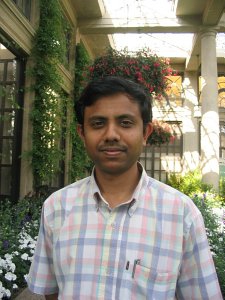-
Center for Cyber-Physical Systems and Internet of Things and Ming Hsieh Institute Seminar

Wed, Dec 04, 2019 @ 02:00 PM - 03:00 PM
Ming Hsieh Department of Electrical and Computer Engineering
Conferences, Lectures, & Seminars
Speaker: Neelesh B. Mehta, ECE Department, Indian Institute of Science, Bangalore
Talk Title: Transmit Antenna Selection in Underlay Spectrum Sharing: Role of Interference Constraint, Channel State Information, and Power Adaptation
Series: Center for Cyber-Physical Systems and Internet of Things
Abstract: Spectrum sharing mitigates the scarcity of radio spectrum by enabling different classes of users to utilize spectrum together without exclusively and inefficiently allocating the spectrum to just one class of users. In the underlay paradigm of spectrum sharing, a low priority secondary user can transmit concurrently in the same spectrum as a high priority primary user but must ensure that the interference it causes to the primary receiver is constrained. We investigate transmit antenna selection to improve the performance of such interference-constrained underlay spectrum sharing systems. It exploits the spatial diversity afforded by multiple antennas but with much less hardware.
We characterize the optimal antenna selection and power adaptation rules for several stochastic interference constraints. The fact that the choice of the antenna at the secondary transmitter is driven not just by the channel gains from it to the secondary receiver's antennas, but also by the interference it causes to the primary receiver makes the class of problems that we study interesting and novel. The optimal antenna selection and power adaptation rules that we arrive at differ significantly from the ad hoc approaches pursued in the literature and lead to markedly lower symbol error rates. They bring out the significant and varied influence the triumvirate of interference constraint, channel state information, and power adaptation has on antenna selection.
Biography: Neelesh B. Mehta is a Professor in the Department of Electrical Communication Engineering at the Indian Institute of Science, Bangalore. Prior to joining IISc in 2007, he worked at AT&T Research Labs, Broadcom Corp., and Mitsubishi Electric Research Labs in USA for 7 years. He received his PhD degree from the California Institute of Technology, Pasadena, USA in 2001 and his B.Tech. degree from the Indian Institute of Technology (IIT) Madras in 1996.
His research focuses on wireless communications. He has worked on topics related to 3G, 4G, and 5G cellular communication standards, energy harvesting and green wireless sensor networks, cognitive radio, cooperative communications, multi-antenna technologies, and multiple access protocols.
He is a Fellow of the IEEE, Indian National Science Academy (INSA), Indian National Academy of Engineering (INAE), and the National Academy of Sciences India (NASI). He is a recipient of several awards such as the Shanti Swarup Bhatnagar Award, Swarnajayanti Fellowship, Khosla National Award, and Vikram Sarabhai Research Award. He served on the Executive Editorial Committee of the IEEE Transactions on Wireless Communications during 2014-17 and served as its Chair during 2017-18. He also served on the Board of Governors of the IEEE Communications Society from 2012-15.
Host: Paul Bogdan, pbogdan@usc.edu
Location: Hughes Aircraft Electrical Engineering Center (EEB) - 132
Audiences: Everyone Is Invited
Contact: Talyia Veal
This event is open to all eligible individuals. USC Viterbi operates all of its activities consistent with the University's Notice of Non-Discrimination. Eligibility is not determined based on race, sex, ethnicity, sexual orientation, or any other prohibited factor.




